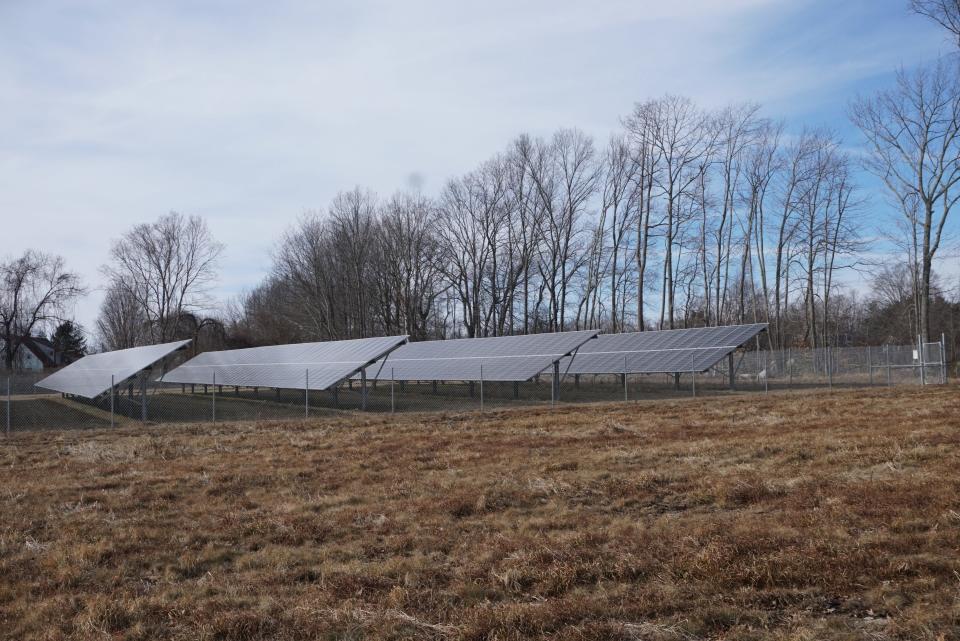Top environmental issues facing RI lawmakers in 2023: Solar farm siting, curbing emissions
PROVIDENCE — How do you follow up on two legislative sessions that have been heralded as the best for policymaking on the environment in Rhode Island history?
With even more bills aimed at tackling climate change, protecting natural resources, reducing trash and expanding investments in renewable energy.
That’s what advocates with some of the state’s leading environmental groups want to see in the new session as it gets underway.
They say that state legislators can’t rest on their laurels after a pair of groundbreaking years in the General Assembly that began with passage in 2021 of the Act on Climate, the emissions-reduction law that’s designed to form the foundation for Rhode Island climate policy, and followed last year with, among a flurry of other bills, one that updates a key law for purchases of cleaner power and another aimed specifically at ramping up offshore wind development.
More:Here's how McKee's $13.8b proposed budget would help environmental causes in Rhode Island

“We had two very successful years, but we still have so much more to do,” said Priscilla De La Cruz, president of the Environment Council of Rhode Island, a coalition of organizations from around the state. “We need this session to be even more successful if we want to meet our Act on Climate goals.”
That was made clear just a few weeks ago when the state council in charge of climate policy adopted a new plan to reduce planet-warming greenhouse gases that aims to do much but would still fall short of the next interim target established by the Act on Climate: a 45% reduction in emissions by 2030.
More:State panel adopts plan for net-zero emissions, but some think it doesn't go far enough
Will RI rein in the use of fossil fuels for home heating?
If the state is to reach that mandatory target and go on to get to net-zero emissions, as the climate law requires by 2050, it will not only mean a comprehensive switch to solar, wind and other greener sources of electricity, but also far-reaching changes to how Rhode Islanders heat their homes and travel.
There’s been talk of creating a Renewable Thermal Standard, which would apply to the heating sector and mirror the existing Renewable Energy Standard for electricity supplies. Such a standard for heating would require gradual statewide reductions in the sector’s emissions.
Or there could be something aimed at updating building standards to stop new hookups to natural gas or oil for heating. It’s not such a radical idea. Moves have already been made in California and Massachusetts to electrify heating systems in new construction and prohibit fossil fuel connections. And utilities regulators here in Rhode Island took the idea seriously when it was posed to them as part of discussions around the gas system on Aquidneck Island.
But if Rhode Island were to adopt a statewide ban, it would be the first in the nation, said Hank Webster, Rhode Island director of the Acadia Center, one of the groups that proposed a moratorium on new gas hookups on Aquidneck Island. And he believes it may not even require legislation but could rather be done by the administration of Gov. Dan McKee.
More:Thinking of upgrading your heating system? Federal dollars on the way
“I think the Act on Climate anticipated this question,” Webster said, pointing to provisions in the law that he and others argue empowers state agencies to take action to rein in emissions.
The Acadia Center, a regional clean-energy group, and a host of other organizations including The Nature Conservancy and the Audubon Society of Rhode Island, are also focused on revamping energy efficiency programs. The state’s efforts to insulate homes, replace outdated appliances and take other steps to conserve energy have long been viewed as among the most effective in the nation, but observers say there is still a lot of room for improvement.
One change on the table could remove incentives to install gas stoves or other appliances that use the fossil fuel, something that may be more realistic than in past years after recent studies raised questions about negative health effects in households that have them.
More broadly, there are concerns that energy efficiency incentives have failed to reach adequate numbers of low- and moderate-income households. There are discussions underway about ways to extend the reach of the programs to renters, multi-family dwellings and homes where English is a second language.
“A lot of people think of energy efficiency as decreasing emissions, but the part I’m focused on is that it decreases energy costs,” said Sen. Alana DiMario, the new chair of the Senate Committee on Environment and Agriculture. “There’s an opportunity to maximize these programs.”
More:The East Coast is navigating a 'Perilous Course' confronting climate change in real time
Top priority: Rethinking the placement of solar projects
If there’s a single piece of legislation that environmentalists are expected to rally around this year, it would probably be reforming the way large solar projects are sited. Rural and suburban communities have been struggling for at least half a decade with complaints about a loss of green space caused by a surge of ground-mounted solar arrays that have been developed on agricultural fields and in clear-cut woodlands.
DiMario and others say this could be the session, after years of failed attempts, to redo how the state incentivizes solar development. While those involved in talks around the issue said that specifics are still being worked out, one idea that many agree on is to use federal infrastructure money allocated to the state to start cleaning up disturbed sites, including landfills, gravel pits and former industrial land, and do other work to make them ready for solar installations.
The goal is to redirect developers away from untouched green space by making previously used sites more attractive.
More:New program will help lower income homeowners get solar panels. Here's how it works.
“We know what a historic moment it is to have all this funding,” said De La Cruz, senior director of government affairs at the Audubon Society of Rhode Island. "We don’t want to see the state miss out on these opportunities.”
She described solar siting reform as her organization’s top priority. So did Sue AnderBois, climate and energy program manager with The Nature Conservancy.
“Unnecessarily, onshore renewables and open space are in conflict,” she said. “We need to protect open space, but we also need to be developing a lot of renewable energy.”

Moves to reduce litter: Banning nips, imposing fee on beverage containers
Also expect to see bills in the coming weeks that aim to address the state’s trash problem, including a ban on nips, the miniature bottles of alcohol that litter roadsides, and a bottle bill that would make consumers pay a fee on beverage containers at the point of sale and give them a refund if they return their empties. Clean Water Action and Save The Bay are among the groups leading the fight to reduce litter.
More:Will banning nip bottles reduce litter? Fireball maker wants to try a new bottle instead
DiMario expects a lot of activity around bills like those that didn’t move forward last year and new proposals around climate change and other environmental issues.
“The Act on Climate really set the stage for us and now we have to fill in the need,” she said. “I look forward to the challenge of continuing to figure that out.”
This article originally appeared on The Providence Journal: Bills on solar siting, emissions expected in RI General Assembly

